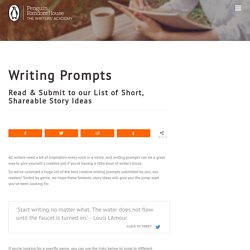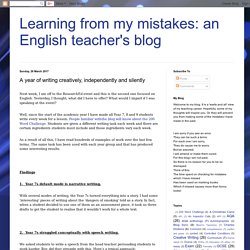

When ideas from Twitter come together… – anewhoffod. I love reading and, as a result, I love teaching reading.

Just this week, I got over-excited reading Oliver Twist with year 8, getting into character as the fight between Noah and Oliver ensued. I like that with reading it is slightly logical or methodical – we are looking for key things within texts and, to an extent, we have a structure that we can use to help pupils enhance their reading of texts. I’ve always found teaching writing much harder. Yes, there are the same nuts and bolts but, at some point, pupils need to pick the baton up and run creatively, something which is harder in my mind to teach. Last year, Chris Curtis introduced the idea of the 200 word writing challenge which I adored. Writing Prompts: Huge List of Story Ideas You Can Use, Share & Add To. Read & Submit to our List of Short, Shareable Story Ideas All writers need a bit of inspiration every once in a while, and writing prompts can be a great way to give yourself a creative jolt if you’re having a little bout of writer’s block.

So we’ve collected a huge list of the best creative writing prompts submitted by you, our readers! Sorted by genre, we hope these fantastic story ideas will give you the jump-start you’ve been looking for. 'Start writing no matter what. The water does not flow until the faucet is turned on.' - Louis L'AmourClick To Tweet If you’re looking for a specific genre, you can use the links below to jump to different categories of prompts: Share Your Prompt Competition.
Resistance to changes in grammar is futile, say researchers. When it comes to changes in language, there’s no point crying over spilt milk: researchers charting fluctuations in English grammar say the rise of certain words, such as spilled, is probably down to chance, and that resistance is futile.

Comparisons have long been drawn between evolution and changes in language, with experts noting that preferences such as a desire for emphasis can act as a type of “natural selection”, affecting which words or forms of grammar are passed on between generations. But a new study shows that another evolutionary mechanism might play a key role : random chance. The authors of the study say that the work adds to our understanding of how language changes over centuries. “Whether it is by random chance or selection, one of the things that is true about English – and indeed other languages – is that the language changes,” said Joshua Plotkin, co-author of the research from the University of Pennsylvania.
But there was a puzzle. Examiner's Report 2017. Creative writing blog. Next week, I am off to the ResearchEd event and this is the second one focused on English.

Yesterday, I thought, what did I have to offer? What would I impart if I was speaking at the event? As a result of all this, I have read hundreds of examples of work over the last few terms. The same task has been used with each year group and that has produced some interesting results. Findings 1. With several modes of writing, the Year 7s turned everything into a story. 2. We asked students to write a speech from the head teacher persuading students to work harder. The head teacher walked to the stage. 3. This was really interesting because we hadn’t explicitly taught dramatic monologues, but the detail, creativity on this style was phenomenal.
GCSE Eng Lang Component 2 bicycles. Edusites War and Espionage. Gettysburg and Blair. Lincoln question 4 exemplar. Language 2 mock exemplars. Cassells Household Guide - chapter by chapter. ‘Golly’, ‘cassette’ and ‘croquet’: the words we no longer use. A huge ongoing study by Lancaster University and Cambridge University has discovered what, in fact, we probably knew already: that word-usage changes continuously under the pressures of historical malaise, new sensitivities, the new machineries of life and fashion.

“Golly” is fast going. No need to ask why. Good thing, too. Help us preserve your dialect: tell us about the unusual words you use. Picture yourself heading out for a jog.

Now picture your footwear. Economist. BIOLOGISTS reckon that most species that have ever existed are extinct.

That is true of words, too. Of the Oxford English Dictionary’s 231,000 entries, at least a fifth are obsolete. They range from “aa”, a stream or waterway (try that in Scrabble), to “zymome”, “that constituent of gluten which is insoluble in alcohol”. That is surely an undercounting. The English have an unusually rich lexicon, in part because first they were conquered (by the Vikings and Norman French) and then they took their turn conquering large swathes of the Earth, in Asia, North America and Africa. Dedicated researchers have managed to capture some of the unwritten ones.
The smaller and more local a word, the more danger it faces of dying out. A study published in 2012 found some evidence for this homogenisation. But DARE’s editors resist the standardisation hypothesis. FoxType. Different exam board but still useful. BBC Bitesize - GCSE English Language - How to compare texts - Revision 2. Unseen-20th-and-21st-century-literary-texts-teacher-guide. Brighton Rock extract. Mr Richardson Mock exam. Texts for Mr Richardson mock. BBC Bitesize - GCSE English Language - Writing fiction - Revision 1.
Literary Non-fiction Texts. Argumentative examplar 2. Argumentative exemplar 1. Revision-GCSE: English Key Words. The new English Language GCSE: introducing 19th century fiction. Despite my delight at the inclusion of unseen 19th century fiction on the new English Language GCSE, I know that it will present some challenges to pupils.

This means it will also present challenges to teachers in working out how pupils will access prose that differs greatly from the kind of prose written today. With that in mind, I thought I’d share how a colleague and I have thought about introducing 19th century fiction to pupils starting the new GCSE this year. We decided that, rather than concentrate on exam skills in the first instance, the initial study of 19th century fiction should be an introduction: we will look at conventions, literary devices and stylistic features.
So, whilst we are teaching for the Edexcel specification*, which differs from other specifications in some ways, this may still be useful as an introduction to 19th century writing if you are using other exam boards, or when introducing the English Literature GCSE 19th century text. Teaching 19th-Century Texts: bringing Victorian literature alive through gaming. Resource. GCSE Bitesize - Writing.